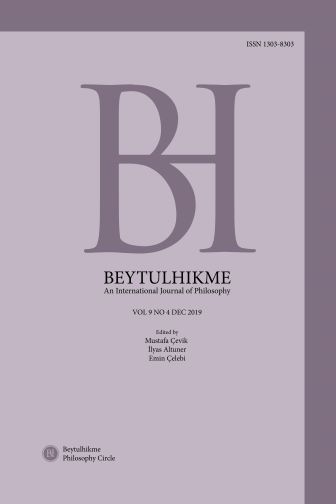Author :
Abstract
“Nasıl yaşamalıyım?” sorusu MacIntyre’ın ahlak felsefesinde merkez bir yer edinir. MacIntryre en meşhur kitabı Erdem Peşinde boyunca modern ahlak felsefesini bu soruya rasyonel ve meşru bir cevap veremediği için eleştirir. Onun ahlak projesi temelde bu soruya verilecek bir yanıtla şekillenir. Bu soruya yanıt vermedeki kararlılığı büyük bir yankı uyandıracak cinstendir, çünkü o, dinin filozoflar arasında cazibesini kaybettiği bir dönemde din ya da Tanrı düşüncesini ahlakı açıklamak için kullanır. Bununla birlikte MacIntyre din ve ahlak arasındaki ilişkiyi tam ve detaylı bir şekilde hiçbir zaman tartışmaz. Bu nedenle onun ahlak teorisi için dine herhangi bir referansının incelenmesi birbirinden çok farklı eserleri içindeki yine birbirinden farklı ifadelerinin sentezlenmesine ihtiyaç duyar. Bunu yaparak makale eleştirel bir bakış eşliğinde MacIntyre’ın hem teorik hem de pratik alanda ahlak felsefesinde Tanrı’nın rolüne dair zamanla gelişen anlayışının tam bir resmini elde etmeyi amaçlar.
Keywords
Abstract
“How should I live?” is the question to which MacIntyre gives the central place in his moral inquiry. MacIntyre, throughout his famous book After Virtue (AV), criticizes modern moral philosophy for failing to provide a rational and justified answer to this question. His moral project is predominantly shaped by the quest for this answer. What he offered had great impact simply because he applied to religion or the idea of God to explain morality at a time when religion lost its charm among philosophers. However, MacIntyre never discusses this connection between religion and morality in a complete and detailed way. Therefore, any examination of his reference to religion for a theory of morality needs to synthesize his different statements from very different texts. In doing this, the article aims to provide a complete picture of his gradually-evolved understanding of the role of God in moral philosophy both at a theoretical and practical level with a critical outlook.
Keywords
- MacIntyre, A. & Nikulin, D. (1996). Wahre Selbsterkenntnis durch Verstehen Unserer Selbst aus der Perspektive Anderer. Deutsche Zeitschrift für Philosophie, 44 (4), 671-684.
- MacIntyre, A. (1961). Difficulties in Christian Belief. London: SCM Press.
- MacIntyre, A. (1967). Secularization and Moral Change. London: Oxford University
- MacIntyre, A. (1969). The Religious Significance of Atheism. New York: Columbia University Press.
- MacIntyre, A. (1979a). Seven Traits for the Future. The Hastings Center Report, 9 (1), 5-7.
- MacIntyre, A. (1979b). Why is the Search for the Foundations of Ethics so Frust- rating. The Hastings Center Report, 9 (4), 16-22.
- MacIntyre, A. (1988). Whose Justice? Which Rationality? Notre Dame: University of Notre Dame Press.
- MacIntyre, A. (1992). Plain Persons and Moral Philosophy: Rules, Virtues and Goods. American Catholic Philosophical Quarterly, LXVI (1), 3-19.
- MacIntyre, A. (2000a). Erdem Peşinde: Ahlak Teorisi Üzerine Bir Çalışma. (Çev. M. Özcan). İstanbul: Ayrıntı Yayınları.
- MacIntyre, A. (2001). Catholic Universities: Dangers, Hopes, Choices. Higher Learning and Catholic Traditions. (Ed. R. E. Sullivan). Notre Dame: University of Notre Dame Press, 1-21.
- MacIntyre, A. (2006a). The Ends of Life, The Ends of Philosophical Writing. The Tasks of Philosophy: Selected Essays, vol. 1. Cambridge: Cambridge University Press, 125-142.
- MacIntyre, A. (2006b). Truth as Good: a Reflection on Fides at Ratio. The Tasks of Philosophy: Selected Essays, vol. 1. Cambridge: Cambridge University Press, 197-215.
- MacIntyre, A. (2006c). Philosophy Recalled to Its Tasks. The Tasks of Philosophy: Selected Essays, vol. 1. Cambridge: Cambridge University Press, 179-196.
- MacIntyre, A. (2006d). Aquinas and the Extent of Moral Disagreements. Ethics and Politics: Selected Essays, vol. 2. Cambridge: Cambridge University Press,
- MacIntyre, A. (2006e). Natural Law as Subversive: The Case of Aquinas. Ethics
- MacIntyre, A. (2009a). God, Philosophy, Universities: A Selective History of the Catho- lic Philosophical Tradition. Maryland: Rowman & Littlefield.
- MacIntyre, A. (2009b). From Answers to Questions: A Response to Responses. Intractable Disputes about the Natural Law: Alasdair MacIntyre and Critics. (Ed. S. L. Cunningham). Notre Dame: University of Notre Dame Press, 313-351.
- MacIntyre, A. (2013). After Virtue: A Study in Moral Theory. London: Bloomsbury.
